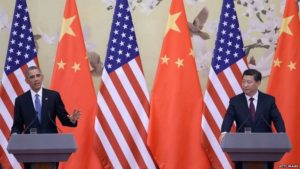
But for many people on the continent, America’s role appears to be a distant, nebulous one, increasingly overshadowed by that of another emerging global super-power.
Here in Lesotho, the Chinese are in almost every village – from the cornfields of the western lowlands right up to the snow-dusted peaks of the mountainous east.
In Nazareth, halfway up a steep hillside an hour’s drive out of the capital Maseru, a cluster of people were gathered at the door of the local store. A young woman from southern China was helping a farmer to load supplies into a pickup truck.
“It’s good here. The air is much cleaner than back home,” she said, politely declining to give her name.
Inside, her Chinese colleague was manning the cash register with China’s CCTV News playing on a television nearby. The only American brand visible came in the form of a handful of Coca Cola bottles in a fridge.
“I’ve been here two years. My relatives were already here. Business is okay. I feel the Basotho people respect us, to a certain point, because we do help out and they think we’re okay as people,” said the shopkeeper.
Some locals grumble about the influx of “Ba-China” – the Chinese – saying they are taking away jobs, and undercutting local businesses.
But many quietly acknowledge the entrepreneurial spirit and resourcefulness of the mainland Chinese and Taiwanese business people whose presence is strikingly obvious in this small nation of some two million people.
“American investors don’t come to Africa… I don’t think they know much about this region, and we need to try and show them what we are, what we do. The Chinese are everywhere. I think they are great explorers,” said Motebang Mokoaleli, from Lesotho’s National Development Corporation.
Read more at bbc.com


